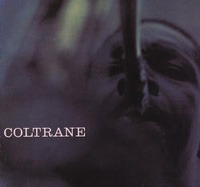 John Coltrane Coltrane's first studio album with the classic quartet (Coltrane; McCoy Tyner on piano; Jimmy Garrison on bass; Elvin Jones on drums)is a mixture of standards and originals that seem very much like an extension of My Favorite Things as informed by Coltrane's 1961 Village Vanguard performances (now available as a box set). It's a great place to go for people who aren't fully schooled in Coltrane, as it doesn't get as out-there as some of the later albums do. Recorded in 1962, more than a year after My Favorite Things, Coltrane even seems slightly more conservative (by Coltrane standards) than that album – although compare it to something else from 1962 (Please Please Me, for example) and the word "conservative" simply does not apply. This quartet was easily the most forward-thinking and explorational of the major jazz groups in the 60s, making the Miles Davis Quintet with Wayne Shorter seem like a bicycle with training wheels. Listening to albums like this, it's impossible to get a feeling other than that of four musicians making music because they felt it. It's tuneful but also challenging, spiritual but also accessible, personal but ultimately wonderful. "Out of This World" opens the album in a "My Favorite Things" mode (it may seem like I overstate that recording's shadow over Coltrane's follow-up work, but it's undeniably there, perhaps because "My Favorite Things" captures so much of Coltrane's essence), but with Coltrane on tenor, investing the standard with a lot of freshness. The cut is 14 minutes long, but doesn't drag at all, and is almost trance-like in its intensity – although it never loses sight of the melody. Great stuff. "Soul Eyes" is a late-nighter Mal Waldron tune, very deep, lulls you into its spell. "The Inchworm" is "my favorite" cut on Coltrane, again using the "My Favorite Things" arrangement (Coltrane on soprano sax, and it's in 6/8) to great effect. Coltrane at this time seemed constantly at war with a straightforward approach to standards and a very "new thing" approach to his own material – in stuff like "Inchworm" it comes together and it's truly amazing. The remaining tracks are all Coltrane compositions, and indicate where the quartet will be going over the course of the next several albums. In many respects the sound isn't too far from some of the harder hard-bop of the period (Wayne Shorter with the Jazz Messengers, particularly), but Coltrane's style always has a uniqueness to it that is immediately identifiable, as much of the Blue Note output tends to blend together in its greatness. "Tunji" is a shout-out to Babatunde Olatunji, and has an Eastern feel to it, very nice. Probably Elvin's best moment on the album. "Miles' Mode" (probably a tribute to someone Coltrane knew named Miles, although I can't think of who that might be – perhaps ambient-pop star Robert Miles? I did say this quartet was forward thinking) is a lighter piece with Coltrane on soprano, and it swings, as far as you can say Coltrane stuff ever really swings. The CD is rounded out by two tracks that didn't appear on the original LP: "Big Nick," which is accessible Coltrane at its finest, very catchy. "Up 'Gainst the Wall" is labelled "volatile" in the liner notes, although I don't see how it is any more volatile than most of Coltrane's stuff from this period; in fact, it's quite a bit more tuneful than the majority of the Coltrane album. It's a fine closer to a great album. Coltrane marks the beginning of one of the finest collaborative efforts in jazz history. The interplay between these musicians is not overrated – it's all that. Some critics have said that Coltrane's studio output was always less "advanced" than his live performances, but if that's so, the studio stuff is still pretty damn advanced compared to everyone else. This is fine early-mid Coltrane, and one of his best non-"difficult" albums. The album is included in its entirety on The Classic Quartet box set, so if you own that, you don't need this, unless you're packaging-obsessed, because Impulse! does so good with packaging. If you're torn, go with the box, but if you're cheap, go with this – knowing full well you'll probably end up getting the box anyway, sucker.
Review by Wimpempy Tarlisle |